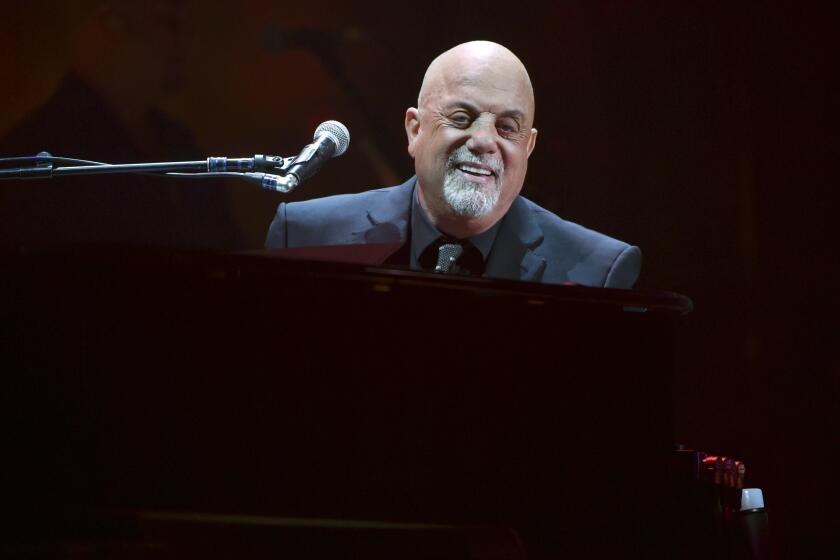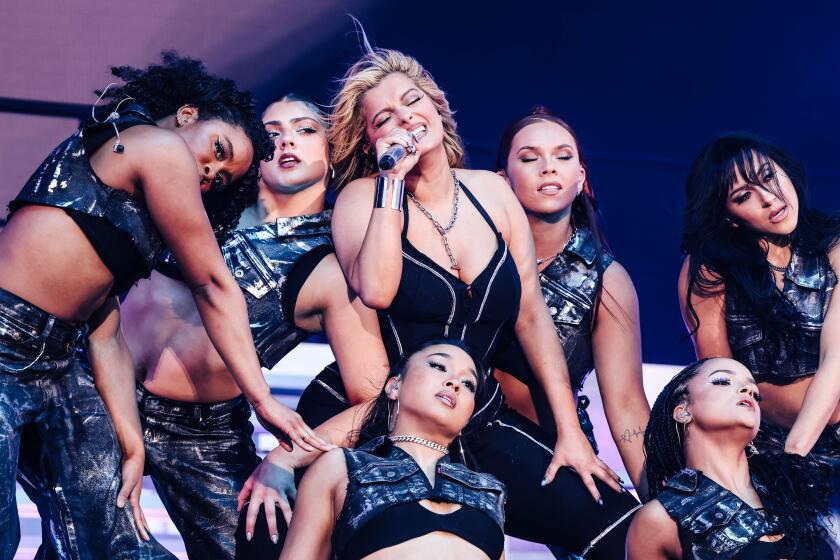Nat King Cole is reinterpreted on ‘Re: Generations’
It was 50 years ago that Nat King Cole went to Brazil and was greeted with staggering street-side ovations. “There was so much affection, it’s hard to describe what it was like,” said Carole Cole, one of the late singer’s daughters. “It was almost like the entire population of Rio de Janeiro turned out en masse to welcome him and throw roses at his feet. He and my mother were invited to stay at the presidential palace. He was treated like royalty.”
How surreal that must have seemed for the crooner who, despite his stately stage persona, was a firebrand figure in his home country, a sort of Jackie Robinson with orchestral accompaniment. Just three years before Cole met the cheering crowds on Ipanema sand, he got a very different reception in Birmingham: The slender singer was toppled from his piano bench when the North Alabama White Citizens’ Council rushed the stage in a bizarre kidnapping attempt.
Cole had fame and fortune in America, but he also found malice -- that would be his last show in his native state or anywhere in the South.
“My dad was an agent of change throughout his life and career,” Carole Cole said. “It’s there in his music and in the way that he lived his life. That is one of the reasons we moved forward with this new project even though I knew that for the core Nat fan of a certain generation, this music was going to be really challenging for them.”
That new project is “Re:Generations,” which takes signature songs by Cole and reimagines them through the prisms of Latin music, hip-hop, reggae and rock, and features acts such as the Roots, Cee-Lo, Brazilian Girls, Cut Chemist and TV on the Radio. The album, released last week, was executive produced by Carole Cole and Michaelangelo L’Acqua, and their approach was to give a free hand to participating producers. The result is a 13-track safari of sorts with remixes that might be jarring for longtime fans of Cole’s graceful body of work.
90th birthday gift
“We had no idea what they would do,” Carole Cole said. “As each track came in, I was amazed by the creativity and the respect and what they came up with. Our idea for the album was being fleshed out track by track. We wanted to musically bridge the so-called generation gap and hopefully create mutual admiration and respect between young people and their parents and grandparents . . . Dad loved music of all kinds and he would be excited about this. I’m sure of it.”
Some traditionalists are less open to the exotic treatment of Cole, who would have celebrated his 90th birthday today. “In speaking to family, friends and peers of my dad, they gave me an earful when they heard the advance,” Carole Cole said. “Some tracks made them absolutely crazy.”
New approaches
Fans of the classic “Straighten Up and Fly Right” won’t be too unsettled by will.i.am (of the Black Eyed Peas) and his spare, beat-minded treatment of a Natalie Cole digital duet with her late father, but the reconstituted “Nature Boy,” blurred by the eerie electronic effects of the New York band TV on the Radio, might be a bit harder to absorb. The Roots, the acclaimed Philadelphia hip-hop collective, brings a twinkling quality to “Walkin’ My Baby Back Home,” while funk auteur Amp Fiddler takes wild liberties with “Anytime, Anyday, Anywhere.”
“That one,” Carole Cole said with a chuckle, “I was hoping that maybe my dad’s fans wouldn’t have too big a problem with it.”
Remixes of classic songbooks are a familiar part of electronic music these days. There have been a half-dozen releases in the Verve Remixed series, for instance, where top DJs apply their sonic alchemy on tracks by Louis Armstrong, Billie Holiday and others, and, of course, the Cole family is quite familiar with the possibilities of posthumous music re-engineering after the success of “Unforgettable: With Love,” the 1991 release that meshed the voices of Natalie Cole and her late father and won the Grammy for album of the year.
That project was a musical valentine within the family, but Carole Cole said this new venture is about the world taking possession of her father’s legacy. “Bringing Dad together with these extraordinary musicians,” she said, “and giving them almost complete autonomy was a total leap of faith, but we believed we could find something profound.”
The artists involved said they left the project with a deeper appreciation of Cole and his music.
Elegance preserved
“The music sounds rich -- it sounds like you should have money in your pocket when you listen to it,” said Cut Chemist, who struggled at first to find a new approach to “Day In -- Day Out” but, after one aborted attempt to add many layers, came up with a loose-limbed remix that might be the album’s most infectious interpretation.
“I’m so happy with the finished product,” said the Jurassic 5 alumnus. “I think this album is going to help a lot of younger people learn about him and his music.”
A true original
Cole, a three-pack-a-day smoker, died of lung cancer the day after Valentine’s Day 1965 at the age of 45. His crushed-velvet sensibilities and distinctive enunciation made for a refined collection of hits, among them “Mona Lisa,” “Unforgettable” and the jaunty “Route 66.” His short-lived NBC variety series, “The Nat King Cole Show,” hit the air in 1956 and became a landmark for African Americans in broadcasting. He famously chided timid advertisers for the truncated 13-month run of the show: “Madison Avenue,” Cole said, “is afraid of the dark.” Cole was a savvy businessman and saw opportunity by singing in other languages, even though he only spoke English. He recorded in French, Portuguese, Spanish, even Japanese, and fans in foreign lands thrilled to the sound of a major American star serenading them in their native tongue.
“That voice, that style, he was so special, there was no else like him,” said Bebel Gilberto, a bossa nova singer who grew up in Rio listening to family stories about Cole’s long-ago visit. Gilberto is featured on the track “Brazilian Love Song” on “Re:Generations” and said she feels that Cole’s voice still echoes for her even though she was born in 1966, after his death. “He meant so much to people all over the world. I think he meant more to Brazil and Latin America than he did even to his own fans in America. . . . I remember hearing him sing and then when I saw him -- so handsome -- I wanted to know more about him and his music. He was the sound of America to many people.”
More to Read
The biggest entertainment stories
Get our big stories about Hollywood, film, television, music, arts, culture and more right in your inbox as soon as they publish.
You may occasionally receive promotional content from the Los Angeles Times.






